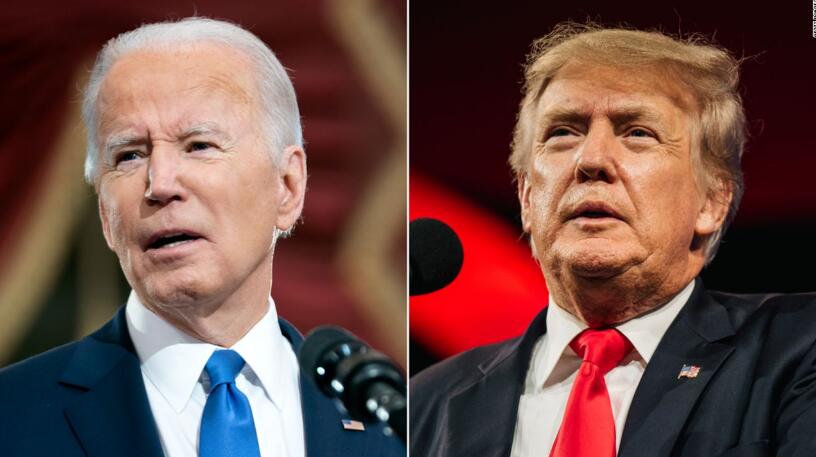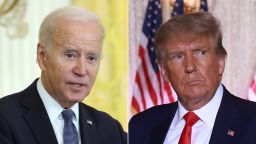
How the midterms changed the 2024 primaries for Biden and Trump
Much of the conversation in the leadup to the midterms revolved around how Republicans were clamoring for former President Donald Trump’s endorsement, while Democrats wanted President Joe Biden to stay away. A little over a month after the election, however, the picture looks quite different.
Biden is in his best position in a while to win the Democratic presidential nomination in 2024. Trump, on the other hand, finds his position among Republicans not only weakened by the midterm results, but he actually trails in a number of polls to Florida Gov. Ron DeSantis in a potential GOP primary.
Perhaps the best indication of Biden’s strength is that he has no obvious potential 2024 primary opponent at this point. Now, as an incumbent, he was unlikely to ever have a slew of challengers. You could have imagined, though, that at least one major Democrat would have challenged Biden had the Democrats done poorly in the midterms.
Instead, the opposite has happened. Major potential foes such as California Gov. Gavin Newsom have said explicitly that they will not run against Biden. Almost every power player in the Democratic Party has said they will back Biden, if he decides to run again.
The same cannot be said for Trump. Even after he declared his run for the presidency last month, just one senator has endorsed his bid for another term. Potential Republican challengers are not bowing out of the 2024 primary.
A big reason for this is that Trump’s poll numbers look weak. I’m not just talking about his polling against other Republicans. I’m talking about how Republican voters see him.
One of Trump’s biggest attributes has been that he has convinced his supporters that he is a winner. Three years ago, polls showed about 80% of Republicans believed he was the party’s best chance to beat the Democratic nominee for president. As recently as late 2021, a plurality of Republicans did so.
A Marist College poll taken after the midterms found that percentage had dropped to 35%, while the percentage of Republicans who thought Trump would not be the strongest candidate jumped to 54%. There can be little doubt that’s at least partially a response to Trump-backed candidates doing poorly in swing states during the midterms.
Base popularity
But it’s not just that fewer Republicans now think that Trump is their best bet in a general election. They’re also less inclined to say they like him. His favorable rating among Republicans in a Quinnipiac University poll in October 2021 stood at 86%. The same poll this month had Trump’s favorable rating at 71% among Republicans.
CNN Poll: Americans have little appetite for Biden-Trump rematch in 2024
Our CNN/SSRS poll out earlier this month found DeSantis with a higher favorable rating than Trump among Republicans, which indicates that the former president is no longer the most liked candidate within his party
This marks another big difference between Biden and Trump: Biden’s trendline for popularity among his base is going in the right direction, and he’s the most popular politician within the Democratic Party. The aforementioned CNN poll put Biden’s favorable rating well into the 80s and well ahead of Vice President Kamala Harris and Newsom among Democrats.
Biden’s job approval rating with Democrats came in at 86% in the Quinnipiac poll. That’s a jump from 79% in Quinnipiac’s poll taken before the election. Indeed, nearly every major poll has Biden’s approval rating above 80% among Democrats. That’s important because every example of a president facing a major intraparty challenge when running for reelection has come when his approval rating was lower than 70% within his own party.
Primary choices
I should note that there are polls (such as the CNN survey) that show more Democrats than not want someone other than Biden to be their the Democratic nominee.
Even here, though, Biden’s got two bits of positive news. First, his numbers, unlike Trump’s, are on the upswing. Second, the vast majority of Democrats could not name a specific candidate besides Biden whom they would want as their nominee.
The rare 2024 polls that match Biden against other named Democrats (such as Harris, who is very unlikely to run against him) put him up by north of 15 points. For comparison, Barack Obama led Hillary Clinton by 15 points in a late-2010 poll of a hypothetical 2012 Democratic primary. Jimmy Carter was trailing Ted Kennedy in late 1978 polling of a hypothetical 1980 primary.
Given the polls, it’s not too surprising that Biden, like Obama and unlike Carter, doesn’t seem to have any powerful Democrat willing to challenge him for his party’s nomination.
Trump’s numbers against other Republicans are far weaker and, again, heading in the wrong direction. When you put Trump against DeSantis and other named candidates, Trump’s onetime 40-point advantage has been slimmed to low double-digits over DeSantis.
Other polling suggests that these findings may understate Trump’s weakness. There isn’t a single poll of a two-way matchup between Trump and DeSantis (that meets CNN’s standards for publication) that has Trump ahead. Marquette University Law School’s poll had Trump down 20 points to the Florida governor a few weeks ago.
Perhaps most interestingly, a Monmouth University poll released on Friday asked Republicans in an open-ended question (i.e., the poll didn’t name any candidates) who they wanted to be their 2024 nominee. Only 26% of respondents picked Trump. He trailed DeSantis, who came in at 39%.
This indicates that Trump’s biggest strength at this point among Republicans is name recognition – something other Republicans will get a lot more of as the primary season heats up.
Biden probably won’t need to worry much about Democrat challengers getting too much oxygen for a simple reason: Nobody who can truly threaten him for the 2024 nomination looks like they’re going to run at this point.



Comments (0)